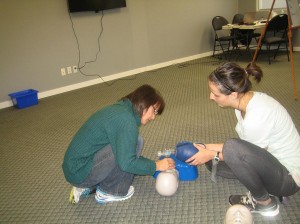The Threat of Heart Disease
With the threat of heart disease looming over the head of millions of Americans, the need for good CPR training should be at the forefront of everybody’s minds. According to the CDC, one in every four Americans has at least one major risk factor in developing heart disease. Over 78 million Americans are actually afflicted with hypertension, one of the biggest factors that can contribute to heart disease.
Heart disease is a dangerous condition that is caused (mainly) by unhealthy lifestyle choices. Eating a lot of food that is high in fat, salt, and sugar, on top of a lack of exercise, greatly predispose a person to weight gain and the deposit of fat in our body’s blood vessels. Smoking is also a big risk factors, with nicotine damaging the blood vessels. Fatty deposits and inflammatory cells are more prone to attach to damaged vessels, building up a substance called plaque, which obstructs the flow of blood.
Getting CPR

The complication that typically arises from severe heart disease is a heart attack. When the vessels become completely obstructed, especially vessels that supply the heart with blood, a person can get a heart attack. Heart attacks are dangerous because they can lead to cardiac arrest, where the heart stops beating completely. Without a functioning heart, our major organs (especially the brain) begin die from a lack of oxygen.
In the event that the heart has completely stopped beating (asystole), chest compressions are given to the victim. This the most basic CPR skill that we teach our trainees. If the cardiac arrest happened in a hospital or similar health care facility, medications are usually given adjunct with the chest compressions. Defibrillation with an AED can only be used on victims who have severe cardiac arrhythmias.
CPR rescuers
If you plan on studying CPR, we have basic and advanced classes available. Out of five training programs and three re-certification classes, we only have one program available to the public, Basic Heartsaver training. The rest of our programs are for health care providers. In our basic courses, you will learn about three core skills used in CPR: compression, ventilation, and defibrillation. More advanced courses shift the focus to medical management, focusing on techniques such as medication administration.
Basic CPR training
- Basic Heartsaver – general public
- Basic Heartsaver C – health care providers
- Basic Life Support for HCPs
Advanced CPR training
- Advanced Cardiac Life Support – health care professionals
- Pediatric Advanced Life Support – health care professionals
All of the courses are certification programs, meaning we award trainees with CPR credentials once they complete the program. Credentials are only valid for two years then they expire. However, we also allow rescuers to renew credentials that are ALMOST EXPIRED (NOT expired) through a re-certification class.
Our locations can be found at:
- Los Angeles, CA
- San Francisco, CA
- Honolulu, HI
- Las Vegas, NV
- Seattle, WA
- Portland, OR
